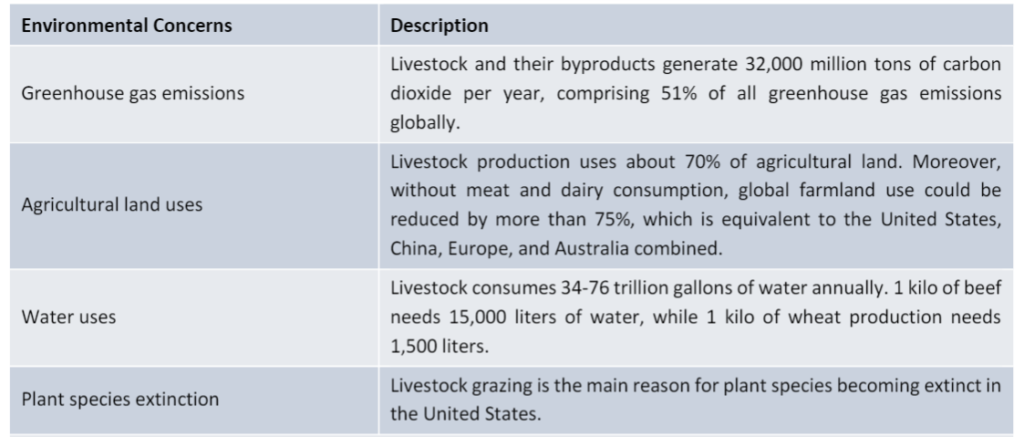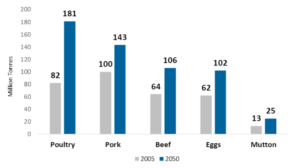
A considerable number of U.S. consumers are adopting a flexitarian diet, and this change is projected to drive the growth of the global plant-based meat market in the coming years. Furthermore, a notable number of consumers, especially in North America and Europe, are following a vegan diet. Thus, a growing flexitarian, vegan, and vegetarian population is projected to positively impact the global plant-based food industry.
Growing Environmental Concerns
Environmental concerns associated with livestock farming are some of the key reasons behind the development of plant-based meat alternatives. Raising livestock contributes to approximately 14.5% of overall greenhouse gas (GHG) emissions. As per the Down to Earth Organization, “Livestock production is the most prominent methane contributor in the world and is responsible for the emission of more greenhouse gases than all the world’s transportation systems combined.” Furthermore, the majority of global agricultural land (70%) is used for livestock production; that land could be utilized for the production of plant-based agricultural commodities to feed the constantly growing population without emitting greenhouse gases.
ENVIRONMENTAL CONCERNS ASSOCIATED WITH LIVESTOCK AGRICULTURE

Source: Down to Earth Organization; Kline’s Plant-Based Meat: Processing Alternatives and Ingredients Assessment report
Government bodies across the world, from the United Nations to the Honolulu City Council, acknowledged the negative impact of livestock production and therefore began to support the development of alternative proteins, including plant-based meat analog. They are encouraging people to adopt a vegetarian diet for the benefit of their health and the overall environment.
Population Growth
There are over seven billion people in the world; that number is projected to reach 9.7 billion by 2050. A growing population means more mouths to feed and greater demand for food resources. In fact, global demand for meat is projected to reach 557 million tonnes by 2050; this is not sustainable, as it negatively impacts the environment. Thus, to fulfill the food requirement of such an immense population while protecting the environment, it is most likely that there will be a huge shift toward plant-based food sources in the future.
GLOBAL DEMAND FOR MEAT, 2005 VS. 2050

Source: Good Food Institute; Kline’s Plant-Based Meat: Processing Alternatives and Ingredients Assessment report
Rapid Expansion of Key Players
Plant-based meat market leaders, such as Beyond Meat and Impossible Foods, have successfully established their businesses in North America and Europe and are now expanding their presence in Asian economies. This is due to the growing inclination of Asian consumers toward plant-based meat and because new plant-based meat players such as Zhenmeat and Starfield are receiving a positive response from Asian consumers. Moreover, Omnipork, which is a plant-based meat company, has successfully presented its products in Hong Kong and are gaining positive responses from consumers.
Beyond Meat first set foot in China in 2019 when it worked in conjunction with the service industry player Marriot, which added Beyond Meat’s products into its menu. Impossible Foods also entered the Asian market in 2019, and its products have been introduced in several restaurants such as Little Bao, Happy Paradise, Beef & Liberty in China, and Gordon Ramsay’s restaurant in Singapore.
Despite the accelerated growth of the global plant-based meat market, taste remains the primary barrier that prevents more consumers from purchasing such products. However, with constant innovations in terms of product development and advancement in processing technologies, plant-based meat manufacturers are expected to curb the challenges associated with the texture and taste of plant-based meat analog.
For a detailed assessment of existing and new processing techniques used for plant-based meat products, refer to Kline’s Plant-Based Meat: Processing Alternatives and Ingredients Assessment study, developed in collaboration with the Wageningen Food & Biobased Research. The report’s focus is on the science and technology of plant-based meat, coupled with an overview of market dynamics and an ingredients assessment, as well as an analysis of current market participants. To receive timely insights on the food & nutrition industry, sign up for our newsletter here.

